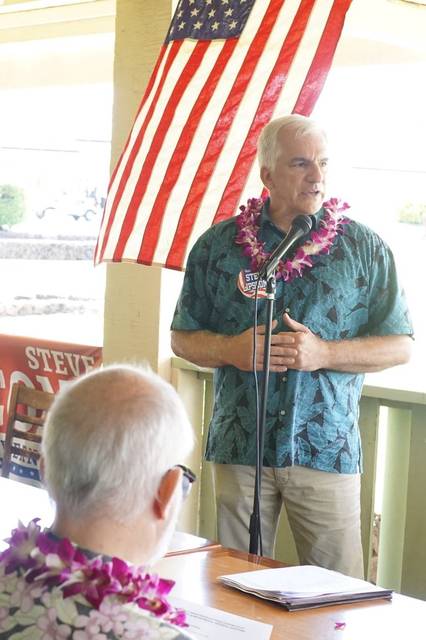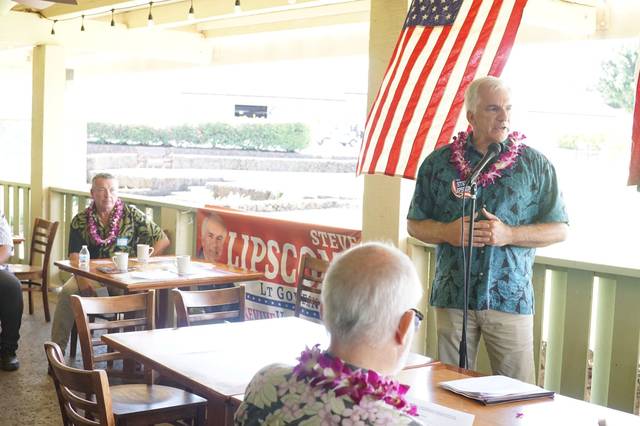WAIKOLOA VILLAGE — Two candidates in the Republican Party primary faced off on issues including affordable housing and agriculture Saturday morning at the Waikoloa Village Golf Club.
But while the two lieutenant governor candidates, Steve Lipscomb and Jeremy Low, might have differences in their visions for the office and how to meet the state’s challenges, both agreed it’s time for a change in leadership.
“You have to ask yourself a fundamental question: ‘Do you think things are OK? Do you think the status quo is fine,” Low said to the crowd in attendance. “If you don’t — and most of us don’t — you need to vote for a change. A real change.”
Low, whose experience includes his work as a research analyst in the Department of Labor and Industrial Relations Office of Language Access during the Lingle Administration and as a legislative aide to Rep. Gene Ward, touted his conservative credentials at the forum, including his life membership in the National Rifle Association as well as his “A” rating from the Hawaii Citizens Rights Political Action Committee, associated with the Hawaii Rifle Association.
Lipscomb, a retired U.S. Air Force pilot who has also worked with Dell and Microsoft and carries the endorsements of former Lt. Gov. James “Duke” Aiona, Rep. Bob McDermott and the Honolulu Star-Advertiser in the Republican primary, is also speaking out about a need for change.
“We’ve had a monopoly forever,” he said. “You guys remember from playing the Monopoly game in the past, the only people that benefit from the monopoly are the people that own it.”
The third Republican candidate in the primary, Marissa Kerns, was not in attendance at Saturday’s forum.
Lipscomb told the crowd he’s focusing on three areas of immediate need for the state — economy, education and environment, “the three Es” as he calls it.
With regard to the economy, he said it’s critical to take steps that drive down the cost of living, like a reevaluation of the Jones Act, and reduce spending, such as audits into all government expenses, rather than raising taxes.
For education, he said, that means both attracting and retaining excellent teachers. He also noted the importance of maintaining Hawaii’s environment and getting a handle on homelessness to ensure the viability of tourism in the islands.
Low shared his vision of the lieutenant governor’s position as an “unofficial inspector general,” distinct from the state auditor, who is appointed through a majority of each house in joint session.
Low said the lieutenant governor has the “duty and authority” to do more than lieutenant governors past.
“It’s a matter of backbone and political will,” he said, “and not just waiting around as a political understudy.”
He also pointed to a need to diversify the state’s economy, emphasizing more agriculture as well as increasing competition in industries like banking and shipping.
In response to a question related to affordable housing, Low said he believes the issue “really isn’t that difficult,” saying it’s a matter of encouraging developers to build it.
“If the market isn’t working, you’ve got to figure why is the market not working,” he said. “And clearly it’s because of the way Democrats have structured government in our state. There’s no incentive.”
Low called for more tax credits for developers who build affordable housing, along with clear, strict definitions on what qualifies as “affordable housing.”
“And you’ve got to follow through,” he said.
Responding specifically to a question about encouraging pre-manufactured, portable homes, Lipscomb meanwhile noted that mobile home parks in the mainland offer housing opportunities that are mobile and affordable.
He noted an idea by Ray L’Heureux, a candidate in the Republican gubernatorial primary, that looks to portable classroom buildings in schools.
“The idea was why not use those, replace those with newer structures for the kids and give them the best that we have right now,” he said. “And re-use, repurpose those portable classrooms to help house the homeless people temporarily until we can get them through triage.”
The candidates also spoke about increasing the state’s food security through local agricultural production, with Lipscomb again referencing the burden he believes the Jones Act puts on imports and exports.
“We became nonprofitable as opposed to other countries that could raise pineapples less expensively than we can,” he said. “So we lost the competition due to our political will.”
He also said he believes there’s opportunities for “high-paying, niche products,” like macadamia nuts and ornamental flowers, but noted the labor needs and infrastructure needs, like water and electricity, to develop a robust agricultural system.
Low too said he believes agriculture is a “very viable” industry, but said it relies on policymakers who believe in it.
If government invested more effort into developing the industry, he said, it could drive down the cost of living and reduce reliance on imported goods from the mainland.
“There still is plenty of agricultural land that isn’t being used properly, or it isn’t being used at all,” he said. “It’s totally doable. The only problem is you have the wrong government presently.”


